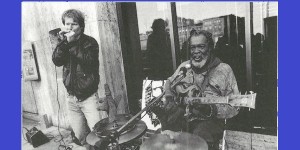Adam Gussow is one of the world’s finest blues harmonica players. He became known, and celebrated, in the 1990s as part of a duo that was one of that decade’s most exciting and intriguing acts, Satan & Adam. “Mr. Satan” sang and played guitar and drums simultaneously with the energy of an Olympic athlete, and a distinct guitar chord style based very creatively on the use of open strings while fretting the instrument on its higher frets. Mr. Satan lived in Harlem, and Satan & Adam emerged as a street act in Harlem at the end of the 1980’s, eventually appearing at other New York City locations and finally at clubs and festivals around the world. They appear briefly in U2’s “rockumentary” Rattle And Hum.
In the early days Adam had to prove himself to the Harlem audience, which he did, as one of the few players who were playing a lot of “overblow” notes on the harmonica – that is, producing pitch changes by strong and very precisely controlled changes in the air blown into the instrument. Coming from different racial, economic, and cultural backgrounds, Mr. Satan and Adam Gussow became friends and partners in blues, making three albums in the 1990s through several years of frenetic playing and traveling that eventually led to major scares for both: a mild heart attack for the young and physically active Gussow, and a nervous breakdown for the older and preternaturally-inspired Mr. Satan.
Gussow still occasionally plays with Mr. Satan, who these days will respond to his given name Sterling Magee. He also plays solo and with other musicians, but the Princeton-educated harp player (who obtained both an undergraduate and PhD degree there) is also a perceptive commentator on the scene and the culture of the blues, a celebrated author, and a professor in the English Department, at – of all schools – Ole Miss, The University Of Mississippi.
The position of professor at Ole Miss with an appointment in the Center For Southern Culture and the English Department was a dream job for Gussow. “I was looking for a tenure-track job, and I got the job at The University of Mississippi,” says Gussow. “Who wouldn’t want that? What blues harmonica player in his right mind doing what I was doing academically wouldn’t want that posting, right?” Surprisingly, none of the full-time English professors at Ole Miss are Mississippi natives (William Faulkner and Eudora Welty may be rolling over in their graves).
Mississippi is famous for all of the blues players who left the place, often for Chicago, but Gussow, a New York native and blues player, reversed the pattern by moving TO Mississippi. In his books and articles, Gussow has proved to be an astute observer of the blues phenomenon and its many contradictions. Contradictions and unexpected outcomes did not end for Gussow with his appointment as a professor. Expecting that he would be playing lots of music, he found that he actually wasn’t, for several years, because the “hill country” blues in the area around the university wasn’t his sound or his experience. He laughingly says the style is summarized by a Junior Kimbrough album title, “Most Things Haven’t Worked Out.” “My wife and I used to joke,” says Gussow. “We’d call it ‘shoot-me now music.'” Gussow has since gotten into it more.
I spoke with Adam Gussow by telephone on April 11, 2013, and, as always, enjoyed the unique insights and stories from his singular history as a player and a scholar of the blues. The wide-ranging discussion of Mississippi music, politics, economics, history, and culture is presented here; it runs just under twenty-five minutes, and I think you’ll like it! [Listen to my conversation with Adam Gussow]
Books by Adam Gussow:
Seems Like Murder Here: Southern Violence and the Blues Tradition by Adam Gussow (Chicago: University Of Chicago Press, 2002)
Journeyman’s Road: Modern Blues Lives from Faulkner’s Mississippi to Post-9/11 New York. (Knoxville: University of Tennessee Press, 2007)
Mister Satan’s Apprentice: The story of an Unlikely Musical Partnership, The Blues, and Race in America (Minneapolis: University of Minnesota Press, 2009)
Check out Adam Gussow’s Modern Blues Harmonica site, the ultimate resource for people who want to hear, learn about, or learn to play blues harmonica.



{ 0 comments… add one now }
You must log in to post a comment.